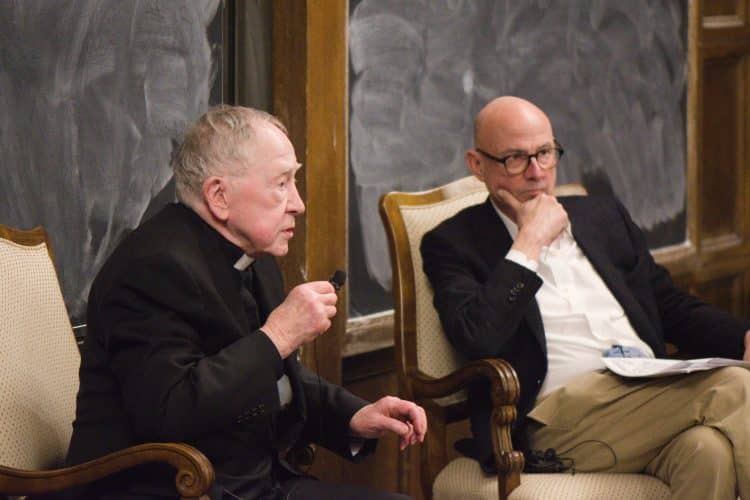Georgetown University theology professor Father John W. O’Malley, SJ, broached the topic of Church governance during a lecture at the University of Chicago, sponsored by the Lumen Christi Institute Dec. 4.
“As everybody knows, the pope runs the Church,” he quipped at the beginning of his lecture, titled “The Open Question of Church Polity and Governance: Trent, Vatican I, Vatican II.”
Father O’Malley admitted that the question is not so simple and proceeded to explain how governance is currently carried out in light of the conciliar tradition of the Catholic Church, particularly the Council of Trent, the First Vatican Council, and the Second Vatican Council.
Father O’Malley gave reasons to consider differing strategies of governance for the Church, particularly in light of the ongoing sexual abuse crisis and the emerging instrument of synodality, both as a concept and as an organism for church governance that has been in use since the Second Vatican Council.
He spoke about how laity historically participated in Church governance: kingdoms appointed bishops; imperial authority was decisive at the Council of Nicaea in the person of Constantine; and kingdoms and principalities sent legates to the Council of Trent to represent their concerns about the Church in the midst of the reformation. All of these were expressions of governance carried out by laity in the Church.
Historically, a synod was synonymous with a council; it was a group gathered in the name of Christ to provide governing resolutions for the Church, he explained. A significant shift took place at the Second Vatican Council, when Paul VI called for a regular synod of bishops that would be only advisory in nature.
The shift from a legislative synod to an advisory synod is important, Father O’Malley said. However, he expressed hope in Pope Francis’s recasting of the synods to have greater effect on Church governance through his emphasis on freedom of expression for the bishops, his inclusion of laity, and his insistence that the organism does not simply rubber stamp an already written document.
Russell Hittinger, senior fellow of the Lumen Christi Institute and visiting faculty at the Committee on Social Thought, responded to Father O’Malley, urging serious reflection about how to involve different representative bodies of the Catholic Church. This would include religious men and women, both active and contemplative, ecclesial movements, and laity.
He said the Protestant Reformation advocated a simplification of the Church’s structure in an attempt to preserve what reformers thought was the core of the Gospel. While Trent created complications, and many today desire reform, Catholics should not expect reform to come so quickly.
“It will go slowly in inverse proportion to its urgency,” he said. To attempt a quick fix, he added, would end in a deformation of the complex organism that is the Church, rather than a true reformation.
